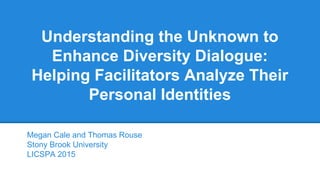This document outlines an activity and discussion aimed at helping diversity trainers analyze their personal identities. The activity has participants identify six core values that shape their identity and select the value they would feel least comfortable training on. The discussion focuses on challenges with diversity training and fears about conducting it. The document also reviews literature on limited training for diversity facilitators and issues with current practices. It provides examples of tools and techniques for preparation, such as surveying audiences and co-facilitation, as well as potential pitfalls to avoid.












